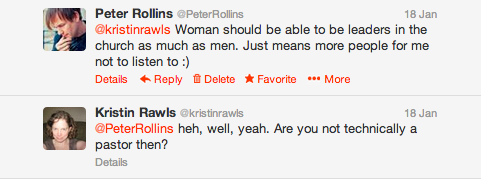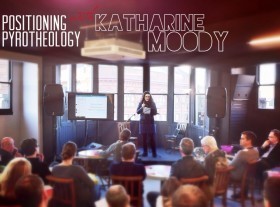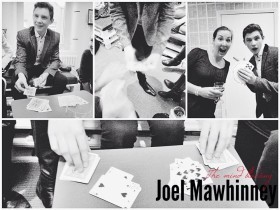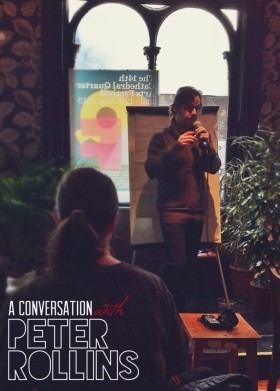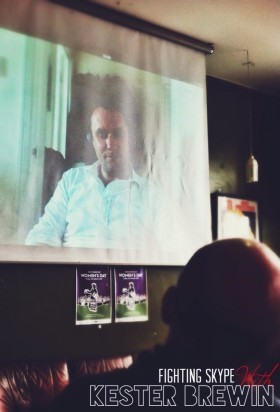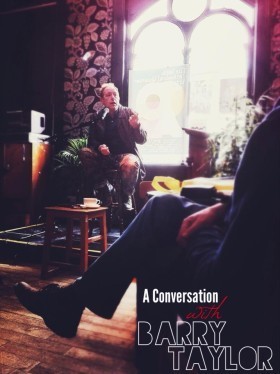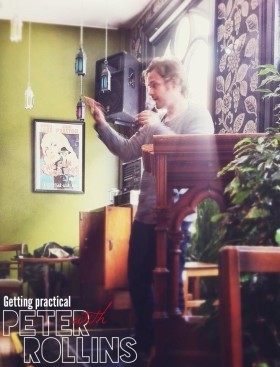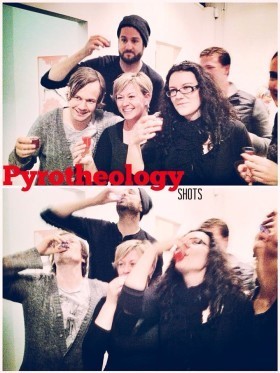Peter Rollins's Blog, page 34
May 29, 2013
On the Demonic and Virtual Reality
Within religious circles the word “demonic” is generally used to describe something either actual or fictional. In the conservative/fundamentalist world demons are real beings who travel around the world creating mischief. On the other side people from the progressive/liberal tradition tend to think of demons and the demonic as terms that were used by pre-scientific societies to describe what we would today label mental illness.
However there is a different way of understanding the demonic that views it as describing neither actual things, nor as referring to a fictional world but rather as describing a virtual reality.
In philosophical terms the virtual is a type of reality that cannot be adequately said to either exist or not exist, but which insists.
For example, fascism doesn’t exist in the sense that it would not be found in a universe where all conscious being were removed. Yet it is something that stands over and above us. It is something that is bigger than any one individual and which can influence behavior even in one who is not conscious of it.
A virtual reality does not necessarily even exist in the mind, for individuals can be deeply influenced by a virtual reality that they don’t even believe in or know exists. For instance, in Northern Ireland sectarianism is a type of reality that continues to insist even though most of the population does not embrace it (meaning that they do not believe one side of the community to be inferior to the other).
Yet sectarianism still has a large (though diminishing) influence on people’s everyday material lives. While not being conscious of it people know what bars they can go to and which are best to avoid, where to buy a house and where to send their children to school.
The sectarian atmosphere helps to regulate people’s everyday activities without necessarily anyone being directly aware of it. Indeed one often only becomes aware of it when someone visits from a different country and asks why we don’t go to certain areas. This then can cause us to consider embedded actions that we generally just enact without thinking (like the driving of a car). As a result it takes great effort to go against the sectarian atmosphere, as well as courage (for some counter-actions are dangerous).
Grammar operates as a type of virtual reality in that it regulates how we put words together, yet it doesn’t exist in our conscious minds (unless we are studying it). Grammar was there before we arrived on the scene and will be there when we leave. It is something that comes from us and that we are immersed in, yet which is not reducible to us. More than this it deeply influences us in ways that are mostly unaware of.
This is why one can say that virtual realities insist – for they exert force upon us whether we know it or not.
The demonic, as an oppressive force upon our lives – a force that is a part of us and yet more than us – captures this virtual dimension. When Paul says that we are not fighting against flesh and blood but principalities and powers we can see how this fits with the ideological struggle that wrestles against systems of injustice that influence how we all live regardless of whether we subjectively affirm them or not.
In light of this understanding of the demonic, demon possession can be approached as the subjective inscription of these systems of injustice into an individuals consciousness. The demonic is the system of injustice that influences the material actions of all those in a society while demon possession is where an individual becomes the actual mouthpiece of that injustice, thus taking the virtuality and making it live in ones direct consciousness.
I think it was Lacan who once commented that it is not only crazy for a king to think that he is a beggar, but also for a king to think that he is a king. In other words the system that creates a king is a virtual structure that exists only to the extent that we live as if it exists. If a king thinks that he is more than a man, but rather a king because of some divine right or special blood, then he is subjectively inscribing the virtual reality into his being. In this way King Joffrey in Game of Thrones is a type of demonic figure in that he really thinks that he is a king (whereas most of the others are cynics who only affirm the structure through their material participation in it).
In philosophy virtual reality thus describes a type of strange reality that does quite exist in the way that tables and chairs do, but that nevertheless has an impact upon us and appears to exist for us. But it only takes the form of an actuality insofar as we live as though it exists.
We might not actually believe in it, but it still informs our behavior in the world until we are able to find ways to ridicule it and live in a way that is not informed by it.
I recently explored these ideas in more detail in a talk that you can listen to here.
May 28, 2013
The Virtual Reality of Demons
Here is a talk I gave at RevolutionNYC exploring the relationship between Virtual Reality, the Demonic, Scapegoating and Conversion.
May 27, 2013
I am Holy, I am Disaster
At an event I curated recently the musician Duke Special performed a magical gig that moved us all deeply. One of the songs that particularly struck a cord with me was called, “Condition” (which I would recommend listening to while reading the rest of this post)
The song itself captures something profoundly insightful about the human experience, an insight that I would like to reflect upon briefly in this post.
In approaching this subject I am reminded of an experience I often feel when being introduced to an audience before I speak. In these situations it is common for the one making the introduction to draw out some elements of my work and life that portray me in a positive light.
While one might think that listening to such an introduction would be a gratifying experience I often find it deeply disturbing. For in listening to what the person is saying I am momentarily confronted with the obvious difference between this portrayal of me and the lived reality of my mundane existence.
So what is going on here? In order to understand it better let us use two terms created by the theorist Lacan,
Ideal-Ego
Ego-Ideal
These can initially be confusing so it might be easier to imagine them like this,
Ideal > Ego
Ego > Ideal
The Ideal-Ego is a term that represents a constructed image of ourselves. This is not just any image, it is an ideal image. One in which we imagine that we are powerful, whole and right (something that likely begins to form in us between 6-18 months at the Mirror Phase). Here the ideal image informs and bolsters our fragile ego (the way we understand ourselves to be).
In contrast, the Ego-Ideal is where our fragile ego is confronted with the ideal we have embraced (I am powerful, whole and right). An ideal that we previously took for granted as being true.
As individuals we use our ideal image like a pair of glasses. That is, we do not seen them but rather they influence how we see everything. There is however a point when we momentarily glimpse the glasses themselves (rather than simply seeing through them).
This moment of seeing what we usually “see through” is the “Ego-Ideal”, and signals a rather traumatic experience. For what happens when we actually look at the ideal image we have of ourselves is that we are confronted by our profound sense of inadequacy.
In short, I come face to face with my weakness, conflicts and doubt. An experience that flies in the face of the image I have embraced about myself.
In theological language we can see this in the following way,
Created in the image of God (Ideal-Ego)
Made from the dust of the earth (Ego-Ideal)
In both theological and psychoanalytic terms the Ideal-Ego comes first and the Ego-Ideal comes second. In short, the experience of being dirt is tied to the experience of being a mirror of God.
The problem is that we often want to flee a confrontation with our ideal. Instead we desire to ignore, repress or disavow it. However, this rejection is more damaging to us than accepting it and embracing it. Not just on a personal level, but on a political level. For the embrace of an Ideal-Ego without a experiencing the Ego-Ideal means that we experience ourselves as profoundly right (just as the embrace of being made in the image of God without the sense of being dust means we experience a deep sense of divine right).
One of the aims of pyrotheology is to help people embrace the traumatic experience signalled by the term “Ego-Ideal.” Not so that we despair of ourselves but so that we might discover the liberative and humanizing possibilities it opens up.
For more information on Pyrotheology check out the website and/or join an online Q&A that I will be running via Google + on June 9th at 4pm EST. To join in this discussion you need to sign up to the Pyrotheology page as that is how we will be be sending people information on how to join the conversation.
Photo courtesy of Sean Tucker
May 22, 2013
Living Fully in the Midst of Worldly Sorrow and Joy
I remember being in a nightclub with a good friend of mine in Belfast. It was late and the place was filled with music, laughter and dance. But in the midst of the entertainment I could see something else going on behind the manifest aesthetic pleasure. Despite all the seeming affirmation of life one could glimpse a nervous grasping of a drink, a momentary loss of confidence, a faked glance at a mobile phone or a faltering kiss unsure of the pleasure it is supposed to be giving and receiving.
The whole mise-en-scene reminded me of something that Johannes de Silentio (one of Kierkegaard’s pseudonyms) wrote in the nineteenth century. He commented that “most people live dejectedly in worldly sorrow and joy.”
He wrote that some do not dance at all but “sit along the wall” while others partake in the revelry. But neither is necessarily free from anxiety, frustration and fear.
Concerning the people who do dance widely Johannes de Silentio noted, “One need not look at them when they are up in the air, but only the instant they touch or have touched the ground – then one recognizes them.” For when their feet touch the ground a careful observer can witness their momentary stagger and half-concealed grimace.
While standing in the nightclub that night I imagined what might happen if the music suddenly stopped, the lights went up and the DJ asked us to put down our drinks so that we might be able to really look at each other for an awkward moment.
In many ways it is this event of “turning on the lights” that I argue is one of the roles of the new collective that arises out of the practice of pyrotheology.
The new collective is to be a desert in the Oasis of our lives. A searingly hot and blindingly light space where we can’t pretend (to ourselves or anyone else) that everything is, or will be, perfect. Where we encounter each other in our beautiful, wondrous, terrifying, human frailty. Not so that we are crushed by the sight, but so that we learn to say “yes” to this vision and to each other in the midst of it.
For it is in saying “amen” to the highs and lows of life that we are able to live fully in both worldly sorrow and joy. Touching what Johannes de Silentio called “the sublime in the pedestrian.”
May 21, 2013
I Only Read Men on Feminism (on Lies, Damned Lies and the Internet)
Admittedly I was a little taken aback when I learned that I only read men when thinking about issues regarding sexual difference. At least this was according to an article that a good friend sent to me. In it I discovered that I didn’t read woman because of the bias they have and preferred to stick to non-biased men,
Some months ago, I had an online exchange with a couple of other women and author Peter Rollins. What started the conversation was his tweet that he only reads men in regard to feminism. I pointed out that if he wanted to know what actual women have to say about ourselves, he needed to read some women who write about feminism. He explained that he doesn’t read what women have to say about feminism and faith because of the “bias” those women have. I could go on forever about the irony of claiming that cis white men are unbiased, and I could also point out that I never instructed him to read Christian feminists–merely that he should read the work of women feminists. We left it with the open possibility that he “might” read some of the recommended writers. I was justifiably angry that a man thought it was okay to inform me that we women are “biased” while men are not. Instead of listening to me or the other women involved in that discussion, several other men began tweeting at me that I should stand down because Rollins is a “nice guy” who means well. (You can read the rest here)
I tried not speaking to myself for a while, after all I was being a total ass! In this online conversation I had admitted that,
I don’t read woman who write about feminism
That I claim woman have a bias that men don’t
That I “might” read woman on the subject of feminism someday (“might” was in brackets so that must have been a direct quote)
.
I felt bad because the person who I had been chatting to hadn’t even asked me to read Christian Feminists but simply pleaded with me to read some woman!
After giving myself the silent treatment I thought that I should give myself the benefit of the doubt and go in search of this online conversation. After all I was pretty sure that I had caught myself reading woman in the past. I could have sworn that I’d seen myself immersed in Kristeva, Irigary, Cixous, Butler, Althaus-Reid and Daly. And was I not reading Malabou’s The New Wounded last week in a coffee shop? Something just wasn’t adding up.
So I found the conversation and pieced it together as best I could (there is a little doubling up as its hard to get it all in, as well as some of it being out of sequence due to the difficulties of re-creating the conversation via twitter feeds). I guess I learned the lesson that I shouldn’t believe everything I read about myself on the web. Turns out the only man I mentioned was the comedian Bill Hicks by light-heartedly quoting how he supported woman in Christian leadership and that it only meant more people for him not to listen to.
The person who made the claims is Amy Mitchell. Oh and it turns out she did ask me to read a Christian Feminist (contrary to her claim ‘and I could also point out that I never instructed him to read Christian feminists–merely that he should read the work of women feminist’ – unless the word ‘follow’ is to be taken literally).
UPDATE: Amy has claimed in her blog comments that I have selectivly picked the tweets below, only using a select few that would seem to go against her claims (above). If I have not included everything that Amy and I said then it was purely because I was trying to piece it all together via twimemachine. However this link goes to the full exchange (at least as far as I can tell). Which, By the way, at the time seemed nice and friendly.
May 15, 2013
Razing Church, Bruceville, TX
This is a youth event where the theme involves embracing our brokenness and being architects of a faith that operates beyond belief. They seek to help college students, college chaplains, young adult leaders engage and be challenged in the topic of new faith practices while also creating time to creatively consider what that looks like in their own location (college campus, church, etc).
I will be speaking at various times during the event
Razing Church, Camp Stevens, CA
This is a youth event where the theme involves embracing our brokenness and being architects of a faith that operates beyond belief. They seek to help college students, college chaplains, young adult leaders engage and be challenged in the topic of new faith practices while also creating time to creatively consider what that looks like in their own location (college campus, church, etc).
I will be speaking at various times during the event
Greenbelt, Gloucestershire, UK
I will be taking part in various discussions on Radical Theology and the practice of Transformance Art.
April 28, 2013
Idolatry of God Event in Belfast
After almost a week of talking, partying, reflecting and sharing life with people who participated in the Idolatry of God event in Belfast I have been taking a day to rest and consider the next step. The whole thing was so much fun that we are already planning to do another event this time next year. Hopefully with some of the original team joining us again.
Using multiple venues and a heady cocktail of magic, music, movies, tours, transformance art, talks, discussion and debate the four days packed in enough work and play for a year.
I’d like to say more, but for now I need to rest. So I will leave you with a few photo’s that offer a glimpse into the highlights. Click on the image to enlarge it (all photo’s taken by Sean Tucker)
April 21, 2013
Holy Crap: The Sacred Undead
In classificatory systems the proletariat is not, strictly speaking, a class at all. Amidst the multitude of different classes (both actual and possible) the proletariat marks those who are excluded from the class system as such. Hence Marx was not particularly interested in class conflict. For Marx the primary conflict was not between various classes, but rather between the various classes (that make up a set) and those who are excluded from the classificatory system as such.
Hence the critique that Marx failed to take into consideration the rising standard of living among the working classes (partly seen in the rise of the middle classes) doesn’t hold as theoretically significant.
We can understand this idea via reference to “Russell’s paradox” as captured in the famous problem of creating a catalogue of “all catalogues that don’t list themselves”.
The paradox can be described as such: If the National Library wishes to create a catalogue that “lists all library catalogues that don’t list themselves,” then the question must be raised, “should that catalogue list itself?”
If the answer is “no” then the catalogue remains incomplete because it fails to list one catalogue that does not list itself within its own pages. Yet if it does include itself then the catalogue contains an error, for in listing itself it actually lists one catalogue that does name itself.
This is how the proletariat can be understood to inhabit our world. For the point is not that they currently exist outside the set of all classes (to be potentially included at some future point), but rather that they are the group that is eternally excluded. More than this they are the excluded group that renders all identificatory markers (whether racial, sexual, religious or cultural) incomplete.
The set of all classes is not incomplete because there are always more classes that could be formed, but rather because the set is always haunted by an outside that it cannot incorporate within itself.
In a Marxist rewriting of that well known Christ saying about the poor always being among us we might say then that, structurally speaking, “the proletariat you will always have with you”.
For they are precisely the excluded that always unsettles the smooth running of our power systems. Who they are will change depending on the historical situation (woman, Jews, Muslims, the gay etc.) but the excluded “class of no class” will continue to exist as the no-things that continually de-center the things that are.
As such the proletariat are a thorn in the side of all class systems, the eternal specter that haunts them, unsettles them and fractures them.
In this way the proletariat are a type of invisible force in history, the dead who are utterly excluded from our systems yet which constantly threatens those systems.
We can sense this logic in a palpable and personal form when walking past a homeless person. Whilst we might attempt to ignore them completely and exclude them from our purview, their presence disturbs us as we pass, forming within us the anxiety of guilt.
In this way the proletariat can be described as the trash of the world. They are the waste that is kept outside the home of our class identifications. In short, they are in the world but not of it.
Interestingly the phrases “being in the world but not of it” and “the trash of the world” have a deeply significant theological meaning. For they are both expressions developed by the apostle Paul to express the essential nature of the Christ collective.
In his book Signs of Emergence Kester Brewin describes how dirt is “matter out of place.” It is that which is in our world and yet which disturbs it. Trash, as the collection of waste that we wish to remove from our homes, is both in our world and yet not of it, there yet somehow standing apart from it.
What strikes us here is the way in which this description of dirt also holds for the idea of the holy. For the holy is also that which is in our world and yet not of it, that which is set apart and disturbs the regular run of things.
By describing the trash of the world as the Christ collective we find a fascinating coincidentia oppositorum occurring in Paul between the sacred and garbage. Something that Brewin grasps in his development of a “theology of dirt.”
In Paul’s definition of the trash-people as the divine collective the crap and the holy are joined together in a type of parallax similar to what we find in the wave-particle duality discovered by physicists.
By employing the logic of Paul we can then claim that the “place of no-place” which the outsider marks is nothing less than the holy site where our world is constantly under threat of being undone.
Theologically speaking the complete outsider, who we treat as dead, thus haunts us as a type of sacred undead. An idea that is beautifully captured in the proclamation of Paul that God chose “the things that are not–to nullify the things that are.”
Peter Rollins's Blog
- Peter Rollins's profile
- 314 followers





